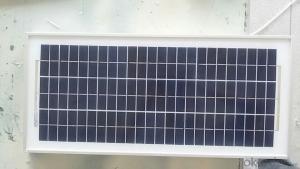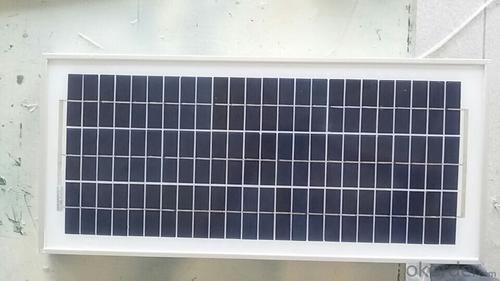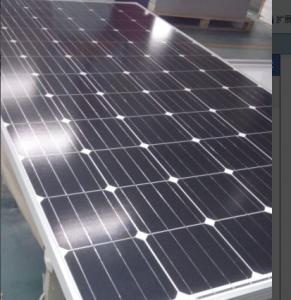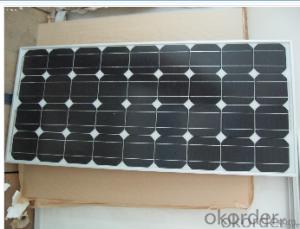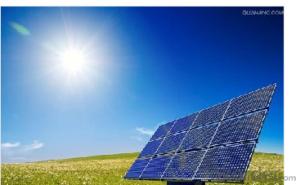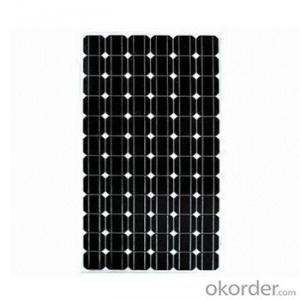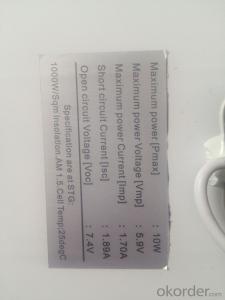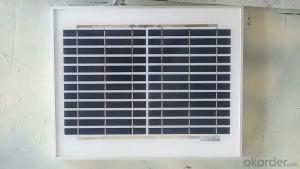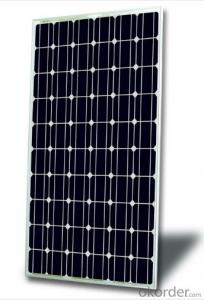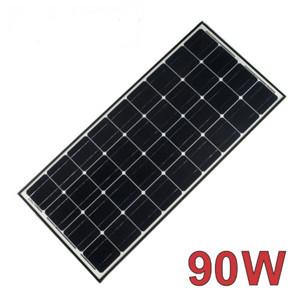Arlo Solar Panels - Monocrystalline Solar Panels 90W for Solar Systems
- Loading Port:
- Shanghai
- Payment Terms:
- TT OR LC
- Min Order Qty:
- 10000 watt
- Supply Capability:
- 50000000 watt/month
OKorder Service Pledge
OKorder Financial Service
You Might Also Like
Product Description
Solar Monocrystalline Series Panels
Introduction of Monocrystalline Solar Panels
CNBM Solar photovoltaic (PV) Panel is designed for large electrical power requirements. It is the optimal choice for both on-grid and off-grid power systems. CNBM Solar panel offers high performance of power per square foot of solar array. Monocrystalline silicon(c-Si): often made using the Czochralski process. Single-crystal wafer cells tend to be expensive, and because they are cut from cylindrical ingots, do not completely cover a square solar cell module without a substantial waste of refined silicon. Hence most c-Si panels have uncovered gaps at the four corners of the cells.
Characteristics of Monocrystalline Solar Panels
I Solar Cell : High efficiency crystalline solar cell. Even if under the weak light, the solar module can produce maximum power output.
II Tempered glass (toughened glass): Anti-reflecting coating and high transmission rate glass increase the power output and mechanical strength of solar module.
III EVA and TPT: Using high quality EVA and TPT to prevent destroying and water.
IV AI frame: Without screw, corner connection. 6 holes on the frame can be installed easily.
V Junction box: Multi function junction box with water proof.
VI Long lifetime: ≥25 years; Less power decrease
VII Good performance of preventing from atrocious weather such as wind and hails.
VIII Resisting moisture and etching effectively, not effected by geology.
Standard Test Conditions of Monocrystalline Solar Panels
The opto-electrical specifications shown below are stabilized values being measured at Standard Test Conditions, Irradiance: 1000W/m2, Spectrum: AM1.5 at 25°C, The info below is subject to manufacturing tolerances. Where appropriate minutes of measurement are available and are used for the dimensioning of the installation.
Advantages of Monocrystalline Solar Panels
1.High reliability with guaranteed -3% to +5% power output tolerance, ensuring return on investment
2. High conversion efficiency based on leading innovative photovoltaic technologies
3. Withstands high wind-pressure and snow load, and extreme temperature variations
4. Attractive appearance Unique frame design, high mechanical strength, and easy Installation
Characteristics of Monocrystalline Solar Panels
Max Power Voltage Vmp (V) | 17.4V | 17.8 V |
Max Power Current Imp (A) | 5.33A | 5.79A |
Open Circuit Voltage Voc (V) | 22.2V | 22.4V |
Short Circuit Current Isc (A) | 5.17A | 5.62A |
Max Power Pm (W) | 90W | 100W |
Temperature Coefficient of Cells
NOCT | 47℃±2℃ |
Temperature Coefficients of Isc (%/℃) | 0.06 |
Temperature Coefficients of Voc (%/℃) | -0.33 |
Temperature Coefficients of Pmp (%/℃) | -0.45 |
Mechanical Data Solar Monocrystalline Series
Power | 90W/100W |
Dimension | 1190×550×30mm |
Weight | 8 kg |
Tolerance | ±3% |
The dimension of the modules can be changed according to the demand of clients Limits.
Operating Temperature | –45 °C to +80°C |
Storage Temperature | –45 °C to +80°C |
Max System Voltage | 700V |
Guarantee Solar Monocrystalline Series Panels
Products Guarantee | 10 years free from defects in materials and workmanship |
Performance Guarantee | No less than 90% within 10yrs and no less than 80% within 25yrs |
Certificates | IEC, ISO, TUV, CE |
Dimension of Solar Monocrystalline Series Panels
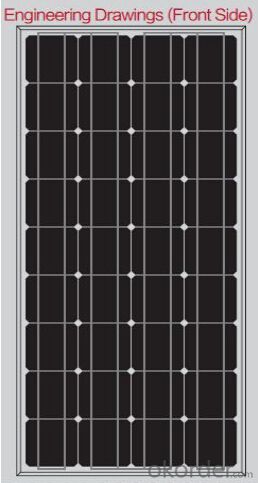
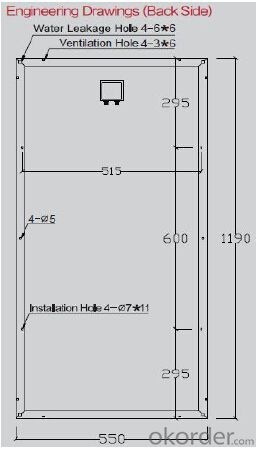
FAQ
We have organized several common questions for our clients,may help you sincerely:
1. What’s price per watt?
A: It’s depends on the quantity, delivery date and payment terms of the order. We can talk further about the detail price issue. Our products is high quality with lower price level.
2. Can you tell me the parameter of your solar panels?
We have different series of cells with different power output, both from c-si to a-si. Please take our specification sheet for your reference.
3. How do you pack your products?
We have rich experience on how to pack the panels to make sure the safety on shipment when it arrives at the destination.
4. What is your warranty system?
Our product performance guarantees for 25 years
• 12 years guarantee for workmanship
• Timeliness of delivery
• Quality Products certified (TÜV, UL, CE, ISO)
5. How do you pack your products?
We have rich experience on how to pack the panels to make sure the safety on shipment when it arrives at the destination.
- Q: Can solar panels be installed on theme parks or entertainment venues?
- Yes, solar panels can be installed on theme parks or entertainment venues. In fact, many parks and venues have already embraced solar energy as a sustainable and cost-effective solution to meet their energy needs. Installing solar panels can help these establishments reduce their carbon footprint, save on electricity costs, and showcase their commitment to renewable energy. Additionally, solar panels can be creatively integrated into the design of the park or venue, adding an aesthetic appeal to the overall atmosphere.
- Q: Well I was thinking about the idea of renovating either a smaller school bus or building a tiny house and I was wondering if i can get some information on the size and watts panel should I use or more like how to get that whole solar energy in motion. Any infor and links would help
- I think that typical solar panels are 2'x4' and produce something like 800-000 wh per day. (That's 0.8 - kwh per day.) More in the summer, less in the winter, if they're aimed sort of at the sun. There are newer, more expensive panels that produce more. There are also thin film panels that are less expensive, and probably more sturdy. You then have a couple choices. In a house, you'd have an expensive inverter to connect to the utility power, so you can have power at night when your panels aren't generating anything. In a trailer, you want 2-4-6 deep cycle car batteries to store the power. Then you could have an inverter to convert that power to 20v AC, so you could use normal appliances. Or, you could buy appliances that run on 2 volts DC. Maybe a combination of both. You'll need to figure out how much power you're going to use, so you know how many panels and batteries you're going to need. The calculation is easy. Figuring out how much power you need is hard. You need deep cycle batteries because you can repeatedly charge them way up and run them way down. Ordinary batteries die fairly quickly when you do that.
- Q: 200 watt solar panel generates how much watts of electricity per month?
- I've operated a 25 kilowatt (kw) solar panel system for two years (44 panels, rated at 90 watts each, just about like yours). It averages 0 kilowatt hours (kwh) per day, but clear days get about 60 kwh. My system generates about 3300 kwh per month (we dump directly to grid), worth about $4,000 per year. Payback for my system, which cost $00,000 (after utility rebates and tax credits), is 25 years (the expected lifetime, coincidentally). Under similar conditions, your 200 watt solar panel would average 820 watt-hours per day, or about 25 kwh per month, worth $2.50.
- Q: Can solar panels be installed on south-facing windows?
- Yes, solar panels can be installed on south-facing windows as long as the windows receive sufficient sunlight throughout the day.
- Q: Can solar panels be used in areas with high levels of snowfall?
- Yes, solar panels can still be used in areas with high levels of snowfall. While snow accumulation on the panels can temporarily reduce their efficiency, modern solar panel designs and technologies have improved to withstand heavy snow loads. Additionally, the angle at which solar panels are installed and their smooth surface can help snow easily slide off, allowing them to continue generating electricity even in snowy conditions.
- Q: Actually I want to convert my home electricity on Solar Panel to cut down electricity costI have 2 AC's, a refrigerator, 3 Television, 2 Computers, 4 Fans etc
- good okorder lots of good ideas there
- Q: what is solar panel? full description needed?
- Solar panels are devices that convert light into electricity. They are called solar panels because most of the time, the most powerful source of light available is the Sun, called Sol by astronomers. Some scientists call them photovoltaics which means, basically, light-electricity. A solar panel is a collection of solar cells. Lots of small solar cells spread over a large area can work together to provide enough power to be useful. The more light that hits a cell, the more electricity it produces, so spacecraft are usually designed with solar panels that can always be pointed at the Sun even as the rest of the body of the spacecraft moves around, much as a tank turret can be aimed independently of where the tank is going. DS's solar cells are even more efficient than regular solar panels made for satellites because they use solar concentrators.
- Q: Can solar panels be installed on warehouses?
- Yes, solar panels can be installed on warehouses. In fact, warehouses are often ideal locations for solar panel installations due to their large roof spaces, which can accommodate a significant number of panels to generate clean and renewable energy. Additionally, warehouses tend to have uninterrupted sunlight exposure, making them well-suited for solar energy generation.
- Q: I have four power packs for solar lights. They have 3 AA .2volt batteries of 2450 mAh capacity installed in series for a total supply voltage of 4 volt maximum for the lights. I want to charge all four packs at once off a single 6 volt solar panel. With the four packs wired in parallel, what capacity output (wattage) panel do I need to charge the batteries in an 8 hour day?
- 3 cells in series makes a 3.6volt 2.4AH battery. You multiply the volts but not the capacity. In parallel would be .2volts, triple capacity. So 4 packs in parallel is 9.8AH. Rule of thumb for charging a flat battery is divide capacity by 0 for amps and charge for 5 hours. amp at 6 volts is doable, that would be 6 watts People who make batteries and solar cells usually over-rate them so I doubt that a solar panel of less than 20 watts rating will fully charge these batteries if they are flat. I'd google to see how you might control the charge current with a simple circuit.
- Q: I have this question for extracredit and I dont get it?How many 2V,2W PV panels would be required to supply a load that requires a 48-volt supply that can push at least 2.8 amps of current, if you assume each panel puts out A at 2 V? And how are the panels configured to supply the power requirements of the load?
- 4 in series for the 48V, a rack of 3 sets wired in parallel to give the current. (total of 2 panels)
Send your message to us
Arlo Solar Panels - Monocrystalline Solar Panels 90W for Solar Systems
- Loading Port:
- Shanghai
- Payment Terms:
- TT OR LC
- Min Order Qty:
- 10000 watt
- Supply Capability:
- 50000000 watt/month
OKorder Service Pledge
OKorder Financial Service
Similar products
Hot products
Hot Searches
Related keywords
